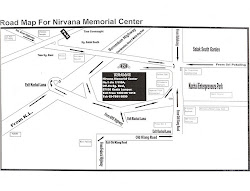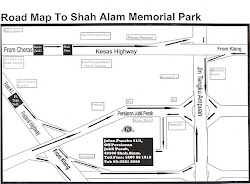人生的喜·怒·哀·乐,寄于时间的流逝,从千古时代至科技蓬勃的现代,有很多天灾人祸发生,在人们还来不及接受这巨大的转变,许多灾难者也无法为自己安排好后事,所以活在当下的人都非常珍惜彼此,应该在适当的时候为自己安排好将来的天家。
身为一位殡葬专业服务者,我所目睹多回的离别,虽然每个人都晓得生·老·病·死是人生必经之路,但又有多少人会为自己准备好将来的天家。
回顾2010年所做过的殡葬服务个案,让我最难忘的就是陈淑仪老师的先生因心脏病离世,让陈淑仪老师一时间不能接受这个事实。还有李秀燕副校长的儿子因车祸离世,李校长也难以接受爱儿的离去。我尽量拨出时间去陪伴及开导她们,到今天李校长对我所说的一番话还言犹在耳,她说我很适合做殡葬服务这个行业,因为我很会关怀,开导及按怃她。
我也感恩我的上司叶燕康夫妇,在他们的帮助及领导下,带领我走向康庄大道。不过有时候因业务上的事情,也因自己的坏脾气,不能控制及管理好自己的情绪,常常爱顶撞他们。我希望2011年能够改过不好的恶习。
还有一天就踏入2011年了,所有好的坏的事情,也会随着时间的飞逝,荡然无存。此时此刻
,应该做的就是展望未来,希望明年会更好。
我也在这里祝大家新年快乐,万事如意。
【生活在人间,时时都离不开境界;所以要以平常心·欢喜心·感恩心面对一切,不让烦恼囤积,停留在脑海。】证严上人语录
Friday, December 31, 2010
Wednesday, December 22, 2010
Monday, December 13, 2010
SEA FUNERAL 海葬
10/12/2010
Ray Soo于三天前联络我,他的父亲於2003年去世,他及家人把父亲的骨灰灵位安奉在八打灵归原基督教骨灰塔,基于他的兄弟姐妹都在国外,而他父亲临终时曾说过要海葬,他为了要完成父亲的遗愿,他要求我帮他租一艘船,将父亲的骨灰撒向大海。
我们於早上九点到达,在NV CARE Bryant的协助下,领取Ray父亲苏祥杰先人的骨灰,就启程前往巴生港口,整个过程大概2个小时完成。
Ray Soo于三天前联络我,他的父亲於2003年去世,他及家人把父亲的骨灰灵位安奉在八打灵归原基督教骨灰塔,基于他的兄弟姐妹都在国外,而他父亲临终时曾说过要海葬,他为了要完成父亲的遗愿,他要求我帮他租一艘船,将父亲的骨灰撒向大海。
我们於早上九点到达,在NV CARE Bryant的协助下,领取Ray父亲苏祥杰先人的骨灰,就启程前往巴生港口,整个过程大概2个小时完成。
Labels:
Sea Funeral Service
Sunday, December 5, 2010
Saturday, December 4, 2010
What is pre-need tomb? 何谓生基风水?
在古代道家有一道法门,称为[生基阵法]:就是运用人的生辰八字及地理磁场的力量,来排[生基阵],将人的先天命理弱势转为旺势的风水大法。人的命是固定的,是属于先天的,而后天的行运,欲可借助[行为]力量来改变,使其原本的恶运,转为平顺;原本顺运,转变为佳运,旺运,生基阵法就是借后天改造运势的方法。其实,造生基并无年龄上严格的限制。
生基风水早在数千年前就已开始盛行,近年来又开始在马来西亚盛行,许多人为了达到做官,功名,保命,增寿,求婚,求子,进禄,招财的目的,便找一处风水宝地,并请名师指点筑造生基。唐代,杨救贫师父曾说:“地理之为鬼神公可改天命也”,意思是说:籍由理气神妙之术,改人先天命理的缺陷,迎吉避凶,以达修造生基寿坟的最终目的。
In the old days, Taoists utilized "sheng ji tactical deployment" to change predestined fate and fortune - they reversed hapless lot into prosperous fate by blending the Eight Characters related to one's date of birth and the geographical magnetic force with one's meritorious deeds. The belief in sheng ji to change destiny dates back to thousands of years ago when ancient Chinese emperors erected pre-need tombs or mausoleum to ensure prosperity for the nation and people upon accession to the thrones. Hence, "sheng ji" basically means pre-need tomb.
The customs live on today and Chinese in Malaysia are fond of making use of the principle of sheng ji to help evoke blessings of achievements, longevity and prosperity upon themselves and the families. The whole idea is by erecting pre-need tomb, one's bad destiny is reversed and be turned into a prosperous one.
生基风水早在数千年前就已开始盛行,近年来又开始在马来西亚盛行,许多人为了达到做官,功名,保命,增寿,求婚,求子,进禄,招财的目的,便找一处风水宝地,并请名师指点筑造生基。唐代,杨救贫师父曾说:“地理之为鬼神公可改天命也”,意思是说:籍由理气神妙之术,改人先天命理的缺陷,迎吉避凶,以达修造生基寿坟的最终目的。
In the old days, Taoists utilized "sheng ji tactical deployment" to change predestined fate and fortune - they reversed hapless lot into prosperous fate by blending the Eight Characters related to one's date of birth and the geographical magnetic force with one's meritorious deeds. The belief in sheng ji to change destiny dates back to thousands of years ago when ancient Chinese emperors erected pre-need tombs or mausoleum to ensure prosperity for the nation and people upon accession to the thrones. Hence, "sheng ji" basically means pre-need tomb.
The customs live on today and Chinese in Malaysia are fond of making use of the principle of sheng ji to help evoke blessings of achievements, longevity and prosperity upon themselves and the families. The whole idea is by erecting pre-need tomb, one's bad destiny is reversed and be turned into a prosperous one.
消灾延寿孝亲超度法会
超度法会 - 感恩缅怀与慎终追远的传统节目
超度法会是后人在感恩和慎终追远的精神驱使下,为先人举行祭祀,祈福仪式的传统节目。它既集中体现出孝道和感恩的文化,也为家族成员提供了一个最佳的追忆空间。
华籍一般上比洋人拥有更浓厚的家庭观念,主要是因为华人很爱惜子女,生前都省吃俭用,让子女接受高深教育,甚至不惜燃烧自己照亮下一代。因此,在儒家的传统思想里,子女反哺养育之恩,是天经地义之事。这种孝心,不但体现在对父母在世时的孝顺,也体现在父母去世后的事死后事生的行为上。这种感恩和慎终追远的美好传统,一直沿续至今,经久不变,而每年落在八月份的富贵山庄消炎延寿孝亲超度法会,就是中最好的写照。
超度法会是后人在感恩和慎终追远的精神驱使下,为先人举行祭祀,祈福仪式的传统节目。它既集中体现出孝道和感恩的文化,也为家族成员提供了一个最佳的追忆空间。
华籍一般上比洋人拥有更浓厚的家庭观念,主要是因为华人很爱惜子女,生前都省吃俭用,让子女接受高深教育,甚至不惜燃烧自己照亮下一代。因此,在儒家的传统思想里,子女反哺养育之恩,是天经地义之事。这种孝心,不但体现在对父母在世时的孝顺,也体现在父母去世后的事死后事生的行为上。这种感恩和慎终追远的美好传统,一直沿续至今,经久不变,而每年落在八月份的富贵山庄消炎延寿孝亲超度法会,就是中最好的写照。
Remains Relocation 拾金
千古孝心
清明节扫墓是华人的传统习俗,除了展现孝子贤孙慎终追远,郭亲睦族及行孝品德外,最重要的是对坟墓作全面的观察,例如坟墓是否有遭受到破坏,糟蹋或自然损陷,如白蚁,淹水,潮湿,炎燥,或有外物侵入等。上述的问题,是很多阳世子孙所担心的,因此,保持墓碑和坟墓的完整,清幽,而使亡灵“居住安定”,应该是阳世子孙的责任。
拾金文化 敬祖孝亲
拾金也叫“拾金”,“捡骨”,“洗骨”,是属于“吉葬”部分。在风水金典“金葬指窍”中详细简明处理的方式及要诀,其内容强调“开金”处理是为了替先人迁葬更好的风水龙穴,借助元运的转变发挥更旺的风水助力。拾金仪式的进行,会因乡例习俗,宗教信仰或籍贯的分别而有所差异。拾金看似简单,其实最重要的是必须由有经验的风水师及捡骨师来办理,切勿草率从事,以免招惹不吉。
在下列情况下须考虑开棺捡骨迁葬:
Remains Relocation - A Befitting Act of Filial Piety
Qing Ming remains a much revered event to pay homage to the ancestors and a gathering for family members to enhance family ties. Not only do they pay homage, but also to pay attention to the condition of the tomb to ensure that it is not in a deplorable conditio.
Remains Relocation is an act of relocating the remains of ancestors to a new burial land with better environment or excellent and/or with excellent fengshui. It is also known as "bone collecting" or "bone cleaning". The remains relocation is not a simple procedure. It has to be conducted by an experienced fengshui master or a relocation master. The procedure varies accordingly to the deceased's religion, cultural practice based on his/her Chinese origins. According to the Chinese, improper relocation could result in bad luck befalling on its descendants.
Why should we relocate remains:
清明节扫墓是华人的传统习俗,除了展现孝子贤孙慎终追远,郭亲睦族及行孝品德外,最重要的是对坟墓作全面的观察,例如坟墓是否有遭受到破坏,糟蹋或自然损陷,如白蚁,淹水,潮湿,炎燥,或有外物侵入等。上述的问题,是很多阳世子孙所担心的,因此,保持墓碑和坟墓的完整,清幽,而使亡灵“居住安定”,应该是阳世子孙的责任。
拾金文化 敬祖孝亲
拾金也叫“拾金”,“捡骨”,“洗骨”,是属于“吉葬”部分。在风水金典“金葬指窍”中详细简明处理的方式及要诀,其内容强调“开金”处理是为了替先人迁葬更好的风水龙穴,借助元运的转变发挥更旺的风水助力。拾金仪式的进行,会因乡例习俗,宗教信仰或籍贯的分别而有所差异。拾金看似简单,其实最重要的是必须由有经验的风水师及捡骨师来办理,切勿草率从事,以免招惹不吉。
在下列情况下须考虑开棺捡骨迁葬:
- 风水不佳,例如:荫尸地,泡水地,煞地,蛇蚁入穴等(请征询专业风水师的意见)
- 坟墓老旧残破,年久失修,应拾金重新造葬或迁葬
- 祖先各葬东南西北,不方便祭拜或维护,应考虑把葬在不同地点之祖先拾金后,集中葬在同一地点以便子孙永祀
- 由专业风水命理师预先选好吉日破土
- 家属,风水师及捡骨师(启攒师)同时抵达现场
- 由风水师带领主持祭拜仪式及破土科仪
- 由捡骨师破土开棺捡骨,洗骨净骨及开棺点眼入瓮或小棺木
- 由风水师主持破碑仪式
- 把金斗瓮或小棺木迁葬至新的风水地,重新造坟立碑将骨灰安奉在骨灰塔内以便子孙永祀
Remains Relocation - A Befitting Act of Filial Piety
Qing Ming remains a much revered event to pay homage to the ancestors and a gathering for family members to enhance family ties. Not only do they pay homage, but also to pay attention to the condition of the tomb to ensure that it is not in a deplorable conditio.
Remains Relocation is an act of relocating the remains of ancestors to a new burial land with better environment or excellent and/or with excellent fengshui. It is also known as "bone collecting" or "bone cleaning". The remains relocation is not a simple procedure. It has to be conducted by an experienced fengshui master or a relocation master. The procedure varies accordingly to the deceased's religion, cultural practice based on his/her Chinese origins. According to the Chinese, improper relocation could result in bad luck befalling on its descendants.
Why should we relocate remains:
- Bad fengshui (Please seek advice from qualified fengshui master)
- Environment condition due to occasional flooding, the presence of pests etc.
- Relocate for the convenience of paying homage.
- A proper date fixed by fengshui master.
- Presence of family members, fengshui master and relocation master at the tomb.
- Worship ritual and exhumation of the remains of the departed one.
- Collecting and cleaning of the remains to place into small wood coffin or urn.
- Ritual of tomb stone breaking.
- Relocate the remains to new burial ground and to erect a new tomb stone or placement of remains to an urn columbarium.
Subscribe to:
Posts (Atom)









